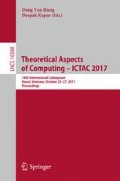Abstract
Natural languages contain regular, context-free, and context-sensitive syntactic constructions, yet none of these classes of formal languages can be identified in the limit from positive examples. Mildly context-sensitive languages are capable to represent some context-sensitive constructions such as multiple agreement, crossed agreement, and duplication. These languages are important for natural language applications due to their expressiveness, and the fact that they are not fully context-sensitive. In this paper, we present a polynomial-time algorithm for inferring subclasses of internal contextual languages using positive examples only, namely strictly and k-uniform internal contextual languages with local maximum selectors which can contain mildly context-sensitive languages.
Access this chapter
Tax calculation will be finalised at checkout
Purchases are for personal use only
Notes
- 1.
In an 1-sided contextual rule either left context is \(\lambda \) or right context is \(\lambda \).
References
Marcus, G.F.: Negative evidence in language acquisition. Cognition 46, 53–85 (1993)
Oates, T., Desai, D., Bhat, V.: Learning k-reversible context-free grammars from positive structural examples. In: Proceedings of the Nineteenth International Conference on Machine Learning (2002)
Oates, T., Armstrong, T., Harris, J., Nejman, M.: On the relationship between lexical semantics and syntax for the inference of context-free grammars. In: Proceedings of AAAI, pp. 431–436 (2004)
Giammarresi, D., Restivo, A.: Two dimensional languages. In: Rozenberg, G., Salomaa, A. (eds.) Handbook of Formal Languages, pp. 215–267. Springer, Heidelberg (1997). doi:10.1007/978-3-642-59126-6_4
Rosenfeld, A., Sironmoney, R.: Picture languages - a survey. Lang. Des. 1, 229–245 (1993)
Haussler, D.: Insertion and iterated insertion as operations on formal languages. Ph.D. Thesis, University of Colorado, Boulder (1982)
Kari, L.: Contextual insertions/deletions and computability. Inf. Comput. 1, 47–61 (1996)
Oates, T., Armstrong, T., Bonache, L.B., Atamas, M.: Inferring grammars for mildly context sensitive languages in polynomial-time. In: Sakakibara, Y., Kobayashi, S., Sato, K., Nishino, T., Tomita, E. (eds.) ICGI 2006. LNCS, vol. 4201, pp. 137–147. Springer, Heidelberg (2006). doi:10.1007/11872436_12
Marcus, S.: Contextual grammars. Revue Roumane de Mathematiques Pures et appliques 14(10), 1525–1534 (1969)
Emerald, J.D., Subramanian, K.G., Thomas, D.G.: Inferring subclasses of contextual languages. In: Oliveira, A.L. (ed.) ICGI 2000. LNCS, vol. 1891, pp. 65–74. Springer, Heidelberg (2000). doi:10.1007/978-3-540-45257-7_6
Ilie, L.: Some recents results on contextual languages. TUCS Technical report No 96 (1997)
Gold, E.M.: Language identification in the limit. Inf. Control 10, 447–474 (1967)
Ehrenfeucht, A., Paun, G., Rozenberg, G.: Contextual grammars and formal languages. In: Rozenberg, G., Salomaa, A. (eds.) Handbook of Formal Language, vol. 2, pp. 237–293. Springer, Heidelberg (1997). doi:10.1007/978-3-662-07675-0_6
Fernau, H., Freund, R., Holzer, M.: Representations of recursively enumerable array languages by contextual array grammars. Fundamenta Informatica 64, 159–170 (2005)
Martin-Vide, C., Mateescu, A., Miguel-Verges, J., Paun, G.: Internal contextual grammars: minimal, maximal, and scattered use of selectors. In: Kappel, M., Sgamir, E. (eds.) Bisfai 95 Conference on Natural Languages and AI, Jerusalem, pp. 132–142 (1995)
Yokomori, T.: Polynomial-time identification algorithm of very simple grammars from positive data. Theor. Comput. Sci. 1(298), 179–206 (2003)
Rama, R., Smitha, T.A.: Some results on array contextual grammars. Int. J. Pattern Recogn. Artif. Intell. 14, 537–550 (2000)
Author information
Authors and Affiliations
Corresponding author
Editor information
Editors and Affiliations
Rights and permissions
Copyright information
© 2017 Springer International Publishing AG
About this paper
Cite this paper
Midya, A., Thomas, D.G., Malik, S., Pani, A.K. (2017). Polynomial Time Learner for Inferring Subclasses of Internal Contextual Grammars with Local Maximum Selectors. In: Hung, D., Kapur, D. (eds) Theoretical Aspects of Computing – ICTAC 2017. ICTAC 2017. Lecture Notes in Computer Science(), vol 10580. Springer, Cham. https://doi.org/10.1007/978-3-319-67729-3_11
Download citation
DOI: https://doi.org/10.1007/978-3-319-67729-3_11
Published:
Publisher Name: Springer, Cham
Print ISBN: 978-3-319-67728-6
Online ISBN: 978-3-319-67729-3
eBook Packages: Computer ScienceComputer Science (R0)

